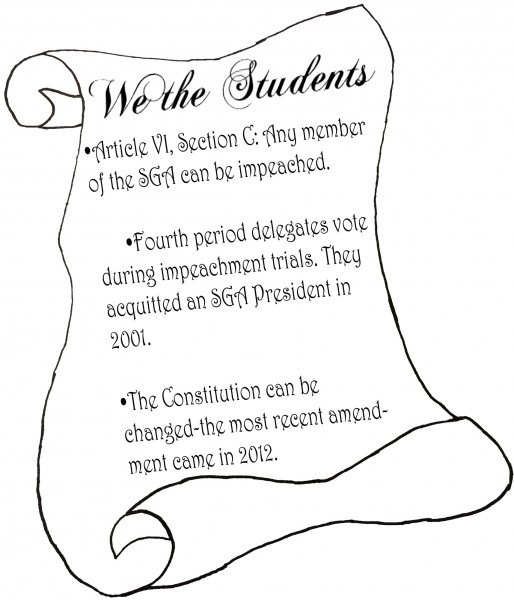You’re elected fourth period delegate, perhaps just because you want to get out of class or were the only kid interested enough to participate. Chances are, you don’t think that your job entails more than a visit to the cafeteria once a month and listening to Whitman news.
In reality, you have more power than you might think.

Whitman has a Constitution that sets guidelines for everything from SGA elections to club funding procedures. Most students don’t know about the Constitution, or the influence it could have.
Article VI, Section C, for example, explains the process for impeachment and removal of office for any SGA member, from a fourth period delegate to the SGA President. An SGA or staff member must present a case for impeachment, and then the general assembly of fourth period delegates votes to convict or acquit the impeached officer. A two-thirds vote removes the SGA member from their position. If the president is impeached, the vice president assumes the position, but impeachment of any other member prompts another election for the successor.
Junior Madison Gestiehr, a fourth period delegate, was unaware of how much power the delegates hold, and was shocked that the general assembly can impeach a member of the SGA without the consensus of the rest of the student body, she said.
Rare as these circumstances may seem, SGA members have been impeached in the past. In 2001, the SGA president was impeached after a teacher caught him cheating on a history exam. The fourth period delegates acquitted him on a 51-19 vote, leaving him in office.
The Constitution does allow amendments, although it specifies that amendment requests must come from the Constitution revision committee. SGA advisor Sheryl Freedman said she assumed the committee would be comprised of students in the leadership class, but was unsure about its specific membership requirements.
The Constitution has been amended a few times, most recently in March of 2012, when new regulations were added for club funding. The executive board (president, vice president, secretaries, and treasurer) introduced the Amendment, and the Constitutional revision committee was never involved.
Despite the Constitution’s potentially important rules and regulations, few people seem to know much about it, and fewer still have a copy. The Constitution remains relatively behind-the-scenes, Freedman said.
On my hunt for a copy of the Constitution, I discovered that Freedman is the only staff member who has a copy on hand. An assistant principal didn’t have it, while a main office secretary, a librarian and numerous students had never even heard of it.
Last year, sophomores Stefan Greenberg and Josh Feder tried to make copies of the Constitution available to everyone, but they gave up when they couldn’t even find a copy themselves. The Constitution is available if the right person (Freedman) is asked, but the pair was hoping to make it easier to find.
“We went to the main office and asked for a copy, but they were unable to provide us with one,” Greenberg said.
In the future, the role of the Constitution will remain the same, Freedman said. It’ll stay potentially powerful, but relatively hidden away from most of Whitman’s population.
If you have any information on who wrote the Constitution or when it was written, please contact The Black & White at [email protected] or comment below.







member of the student body • Mar 29, 2018 at 10:47 am
anyone have the link for the constitution
Very concerned member of the student body • Mar 29, 2018 at 10:46 am
anyone have the link for the constitution